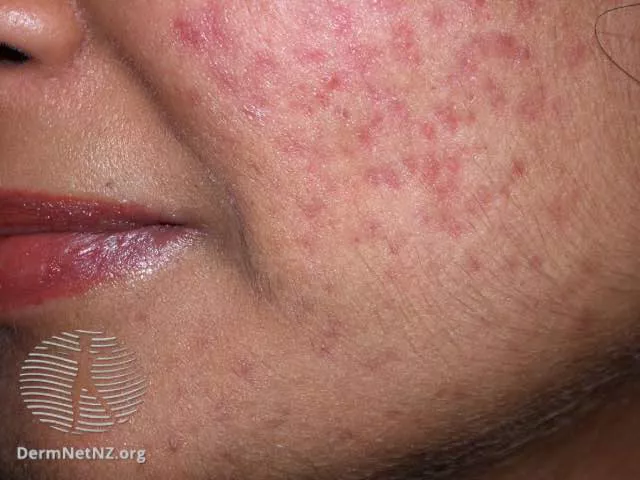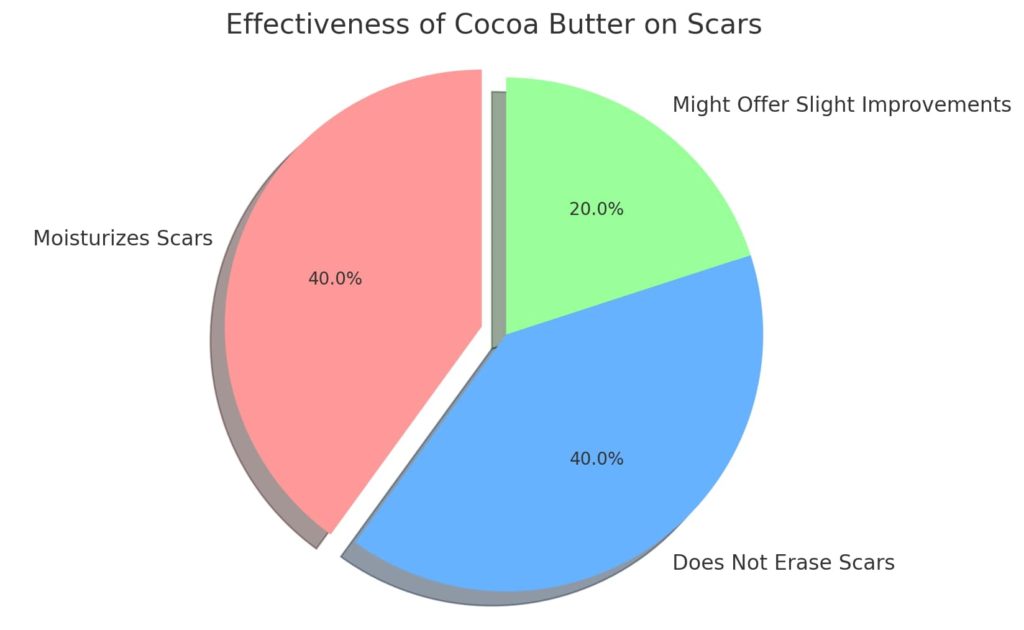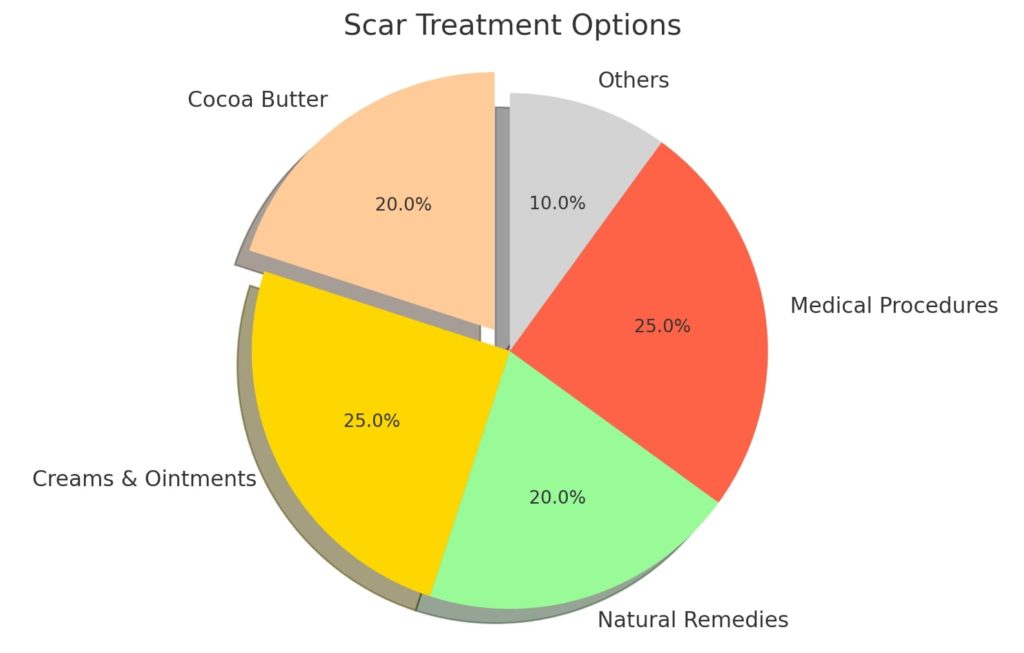Cocoa Butter and Scars: Here’s the Truth
Cocoa butter and scars: is there any possibility of removal? While cocoa butter can enhance a scar’s appearance by keeping it moisturised and supple, it won’t completely erase it.
Regular use might offer slight improvements, but fully eliminating scars remains challenging.
Nonetheless, using cocoa butter can prevent scars from drying out, maintaining skin elasticity.
The Truth About Cocoa Butter and Scars – Treatment Options
You’ve likely heard cocoa butter touted as a miracle remedy for reducing scars, but is it really?
This article aims to explore the scientific truth behind cocoa butter’s ability to treat scars, providing clarity on this common skincare question. K
Cocoa Butter and Scars – Key Takeaways
- Cocoa butter is not the most effective scar treatment option as there is a lack of evidence supporting its ability to stimulate collagen production and reduce scars.
- Alternative scar treatment options that have been proven to be more effective include silicone sheets or gels, medicated creams or ointments, laser therapy, microdermabrasion, and chemical peels.
- While cocoa butter has hydrating benefits for the skin and contains nourishing ingredients, clinical studies have not provided conclusive proof of its efficacy in reducing or fading scars compared to other treatments like silicone-based products, laser therapy, microneedling, chemical peels, prescription medications, and surgical scar revision.
- It is important to consult with a dermatologist or skincare professional for personalized advice on the best scar treatment option based on your specific needs and condition.

Acne with red marks – Image Copyright: DermNet / CC BY-NC-ND
Author Expertise: I’m Patri Hernandez, a certified dermo-cosmetic technician and health coach. I blend my love for skincare with holistic wellness insights. My goal? To help you achieve radiant skin and a happier, healthier you! 😊 Patri Hernandez
Why Cocoa Butter is Not the Best Scar Treatment Option
Cocoa butter may not be the best choice for treating scars due to a lack of evidence supporting its ability to stimulate collagen production and other more effective alternatives available.
Here’s a diagram for easier visual understanding:

Lack of evidence for stimulating collagen production
Though many tout cocoa butter as a solution for scar management, there is scant evidence to support its usefulness in stimulating collagen production. Essential to skin health and healing, collagen helps give skin its strength and elasticity.
We might expect a reputed cure like cocoa butter to spur this important protein’s growth, but unfortunately, that isn’t the case. In fact, many studies have shown that it doesn’t outperform other moisturizers in this arena.
This points us towards seeking more efficacious scar treatment options which are backed by solid scientific evidence.
Other more effective scar treatment alternatives
There are several scar treatment options that have been proven to be more effective than cocoa butter. Consider trying these alternatives for better results:
- Silicone sheets or gels: Silicone has shown promising results in reducing the appearance of scars. It creates a protective barrier that helps lock in moisture and flatten the scar tissue.
- Medicated creams or ointments: Products containing ingredients like retinol, hydroquinone, or corticosteroids can help fade scars by promoting cell turnover, reducing inflammation, and inhibiting excess pigment production.
- Laser therapy: This non-invasive treatment uses laser beams to break down scar tissue and stimulate collagen production. It can effectively reduce the appearance of scars and improve skin texture.
- Microdermabrasion: This procedure involves gently exfoliating the top layer of skin to remove dead cells and promote new cell growth. It can be useful in smoothing out scars and improving overall skin tone.
- Chemical peels: These treatments involve applying a chemical solution to the skin, which causes controlled damage and prompts the body to produce new, healthier skin cells. They can be effective in minimizing the appearance of scars.
- Vitamin C serums: Vitamin C has antioxidant properties that can help improve the appearance of scars by promoting collagen synthesis and reducing inflammation.
- Dermal fillers: In cases where scars have caused depressions or unevenness in the skin, dermal fillers can be injected beneath the scarred area to restore volume and create smoother skin texture.
- Retinoids: Derived from vitamin A, retinoids can help stimulate cell turnover and promote scar healing. They can be used topically or taken orally under the guidance of a dermatologist.
- Surgical scar revision: In some cases, surgical scar revision may be necessary for large or complex scars that do not respond to other treatments. This procedure aims to minimize the scar’s visibility by removing or repositioning it.

SCARS VS STRETCH MARKS: Cocoa butter is great for preventing and improving the appearance of stretch marks. Its rich, moisturising properties help keep the skin hydrated and elastic, which can reduce the formation of new stretch marks during pregnancy or weight changes. Regular use can make the skin smoother and more supple, which might slightly improve existing stretch marks. More on cocoa butter and stretch marks here.
However, cocoa butter isn’t very effective for treating scars. While it can help keep the skin around a scar moisturised and reduce dryness, it doesn’t penetrate deeply enough to significantly heal or reduce scar tissue. For better results with scars, consider treatments like silicone gels or specific scar-reducing creams.
The Science Behind Cocoa Butter and Scars
Cocoa butter is derived from the cocoa bean and contains various fatty acids, including stearic acid, oleic acid, and palmitic acid.
Cocoa butter components
Cocoa butter, derived from the cocoa bean, is packed with beneficial ingredients for the skin. It contains natural fats, including stearic acid and palmitic acid, that help to form a protective barrier on the skin’s surface.
These fatty acids also provide excellent hydration benefits and can replenish moisture in dry or damaged skin. Additionally, cocoa butter contains antioxidants like polyphenols and vitamin E, which can help reduce inflammation and protect against free radicals.
Overall, these nourishing components make cocoa butter a popular choice in skincare products aimed at moisturizing and softening the skin.
I will list some of the primary fatty acids present in cocoa butter:
- Stearic Acid: Makes up a significant portion of cocoa butter and provides a solid texture.
- Oleic Acid: Another primary fatty acid in cocoa butter, it’s known for its moisturizing properties.
- Palmitic Acid: Found in smaller amounts but contributes to the butter’s moisturizing properties.
- Linoleic Acid (Omega-6): Essential fatty acid present in smaller amounts.
- Arachidic Acid: Found in trace amounts.
Here’s a helpful table:
| Fatty Acid | Approximate Percentage (%) | Properties |
|---|---|---|
| Stearic Acid | 35% | Provides solid texture |
| Oleic Acid | 34% | Moisturizing + softens |
| Palmitic Acid | 25% | Moisturizing + softens |
| Linoleic Acid (Omega-6) | 3% | Essential fatty acid |
| Arachidic Acid | 1% | Trace amounts |
Hydration benefits for the skin
Cocoa butter offers hydration benefits for the skin, making it feel soft and smooth. This natural emollient is rich in fatty acids that help to lock in moisture, keeping the skin hydrated throughout the day.
The moisturizing properties of cocoa butter can also help to improve the overall texture and appearance of scars. By keeping the skin well-hydrated, cocoa butter helps to prevent dryness and flakiness, which can make scars look more prominent.
Additionally, cocoa butter contains vitamin E, a powerful antioxidant that helps to reduce inflammation and promote healing. Using skincare products containing cocoa butter can provide nourishment for your skin while supporting its natural regeneration process.
Clinical Studies on Cocoa Butter for Scars
Various clinical studies have been conducted to assess the effectiveness of cocoa butter on scars, but unfortunately, there is a lack of significant evidence supporting its efficacy in scar reduction.
Lack of significant evidence supporting its efficacy
Despite its popularity as a natural remedy for scars, there is a lack of substantial evidence supporting the efficacy of cocoa butter. While cocoa butter contains nourishing ingredients and has hydrating benefits for the skin, clinical studies have not provided conclusive proof that it effectively reduces or fades scars.
In fact, other scar treatment options such as silicone-based gels or sheets, laser therapy, or even over-the-counter creams with specific active ingredients like vitamin C or retinol have shown more promising results in improving the appearance of scars.
It’s important to consult with a dermatologist who can provide personalized advice on effective scar treatment options tailored to your specific needs.
What the Experts Say
Here are some expert insights and quotes related to cocoa butter and its effects on scars:
- Ink-B-Gone Tattoo Removal: “Do Not Use Cocoa Butter and Salt to Remove Tattoos!” Source
- Healthline: “It may help reduce the appearance of stretch marks and scarring. It’s thought that shea butter stops keloid fibroblasts — scar tissue — from replicating.” Note: This quote is about shea butter, but it’s relevant as cocoa butter is often compared to shea butter in terms of skin benefits. Source
- Moneycontrol: “Benefits of cocoa butter: More than satisfying your chocolate cravings, it works its magic on stretch marks and scars effectively.” Source
Helpful Forum Threads on the Topic of Cocoa Butter and Scars
Here are some forum threads discussing cocoa butter and its effects on scars:
- Is Cocoa Butter Good for Tattoos? – Many topic threads and online forums are dedicated to sharing tattoo aftercare and cocoa butter tips, questions, and usage instructions. Source
- Cocoa butter vs Shea butter? | Badger & Blade – Cocoa butter has been known to help heal scars and blemishes, but there aren’t too many studies backing it. Source
- Any tips for scar management? | Joint Replacement Patient Forum – Discussion about various scar management techniques, including the use of cocoa butter. Source
- Does cocoa butter actually help scars? | Lipstick Alley – A discussion on whether cocoa butter, shea butter, and Vitamin E directly help scars or just keep them lubricated and moisturized. Source
Conclusion
When it comes to scar treatment, cocoa butter may not be your best option. Instead of relying solely on this popular remedy, it’s important to explore other effective treatments and consult with a dermatologist for personalized advice.
Take the time to consider alternative options that have proven efficacy in improving the appearance of scars and softening their texture. There’s no need to settle for less when it comes to achieving optimal results in scar management.
Consulting with a dermatologist for personalized advice
To explore the best scar treatment options for your specific needs, it’s always a good idea to consult with a dermatologist. They can provide personalized advice based on your skin type, the severity of your scars, and other factors that may affect your healing process.
Dermatologists are experts in understanding the science behind scar reduction and can recommend effective treatments tailored to your unique situation. Whether you’re considering natural remedies or medical interventions, consulting with a dermatologist will ensure that you receive the most accurate information and guidance on how to improve the appearance of your scars.
Leave Comments & Feedback
We’d love to hear your thoughts and experiences! Please drop a comment below and share your feedback—it helps us create content that resonates with you. Your insights are invaluable to us! 🌟
FAQs
Q: What is cocoa butter?
A: Cocoa butter is a natural fat extracted from the cacao bean. It is commonly used in skincare products due to its moisturizing properties.
Q: Can cocoa butter improve the appearance of scars?
A: While some people believe that cocoa butter can help improve the appearance of scars, there is limited scientific evidence to support this claim.
Q: Is it possible to get rid of scars completely?
A: Completely getting rid of scars is not always possible. However, there are treatments and products available that can help minimize their appearance.
Q: Can cocoa butter be used as a natural remedy for scars?
A: While cocoa butter is a natural ingredient, its effectiveness in reducing scars is not clinically proven. Other remedies, like silicone gel, have been found to be more effective.
Q: Can silicone scar sheets or gels work for scar treatment?
A: Yes, silicone scar sheets or gels have been clinically proven to improve the appearance of scars. They can be effective in reducing scar size and flattening raised scars.
Q: How long does it take for scars to fade?
A: Scar healing varies from person to person. It can take months or even years for scars to fade. Consistent scar care and appropriate treatment can help speed up the process.
Q: Can cocoa butter help with stretch marks?
A: While cocoa butter is often recommended for stretch marks, its effectiveness is not supported by scientific evidence. There are other treatments available that may be more effective.
Q: Are silicone scar sheets safe to use?
A: Yes, silicone scar sheets are safe to use. They have been used for over 30 years and are widely recommended by healthcare professionals for scar treatment.
Q: Does the size of the scar affect the treatment options?
A: The size of the scar can affect the choice of treatment options. Larger scars may require more intensive treatments, while smaller scars may respond well to topical solutions.
Q: Can cocoa butter help with keloid scars?
A: Cocoa butter is not known to be an effective treatment for keloid scars. Keloid scars may require specialized treatments, such as corticosteroid injections or laser therapy.
References
- Commander SJ, Chamata E, Cox J, Dickey RM, Lee EI. Update on Postsurgical Scar Management. Semin Plast Surg [Internet]. 2016 [cited 2023 Jul 28]; 30(3):122–8. Available from: https://www.ncbi.nlm.nih.gov/pmc/articles/PMC4961501/.
- Does Cocoa Butter Remove Acne Scars? Verywell Health [Internet]. [cited 2023 Jul 28]. Available from: https://www.verywellhealth.com/will-cocoa-butter-remove-acne-marks-15592.
- Ud-Din S, McGeorge D, Bayat A. Topical management of striae distensae (stretch marks): prevention and therapy of striae rubrae and albae. J Eur Acad Dermatol Venereol. 2016;30(2):211–222. doi:10.1111/jdv.13223
- Davis EC, Callender VD. Postinflammatory hyperpigmentation: a review of the epidemiology, clinical features, and treatment options in skin of color. J Clin Aesthet Dermatol. 2010;3(7):20-31
